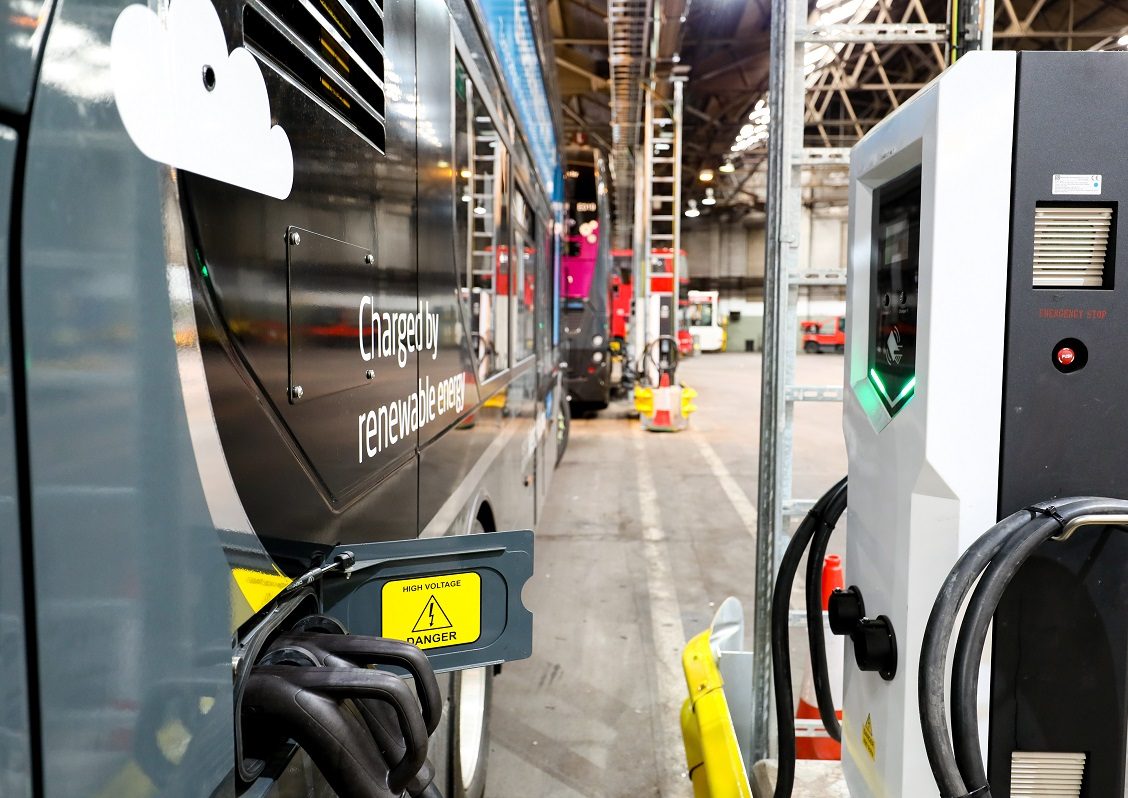A guide to UK funding for switching bus fleets to electric

The UK has pledged to decarbonise all road transport by 2040 and last year the government showed that they meant it – albeit with a focus firmly on bus over other fleet.
In England the funding was mainly funnelled through local authorities, often with operator partners and with an increasing emphasis on finding private match funding, to ensure that the public pound goes further. In Scotland, the funding is aimed at operators but has also shifted towards partnerships, match funding and collaboration.
Below is an overview of the zero-emissions bus funding options that was made available in 2021 and a list of funds still potentially or soon to be available.
Already at shortlist stage or awarded last year (2021) >>
- Zero Emission Bus Regional Areas (ZEBRA) – England
The 2021/22 ZEBRA scheme is a Bus Back Better initiative (the government strategy paper published in March 21) and provides funding to English Local Transport Authorities (LTAs) outside London to support the introduction of zero-emission buses and associated infrastructure. Successful bidders must work with local operators and will, for each new electric bus they propose, receive 75% of the cost difference between it and a new diesel bus and 75% of the costs of new infrastructure.
Fast track – already awarded:
Almost £71 million of ZEBRA funding was announced in November 2021, to five LTAs selected under the fast-track process. This funding will support up to 335 zero emission buses and infrastructure in Cambridgeshire and Peterborough Combined Authority, Kent County Council, Leicester City Council, Milton Keynes Borough Council and Warrington Borough Council.
Standard track – projects already shortlisted:
17 further LTAs have been selected to progress under ZEBRA’s standard process, with access to a total of £200m), with final business cases being submitted in January 2022 and awards announced in February 2022.
SULEBS ran for two rounds in August/September 2020 and January/February 2021, deploying more than £50m in funding to subsidise new electric buses and charging infrastructure in Scotland in November 2021. Awards this year were made to First Glasgow, McGills, Ember Core, Stagecoach West, Stagecoach East and Stagecoach Bluebird.
- Scotland Zero Emission Bus challenge fund Phase 1 (ScotZEB) – applications submitted
SULEBS has been replaced by ScotZEB which is “a new challenge fund focussed on supporting innovative business models designed around the characteristics and opportunities presented by zero-emission buses and associated charging or refuelling infrastructure”. The documentation states that operators should minimise the grant subsidy required by working with partners and collaborators including local authorities, energy suppliers and private finance.
The first phase of funding is due to be awarded in January 2022.
- City Region Sustainable Transport Settlements – allocated
This initiative sits alongside the Levelling Up Fund as a source of money for investment specifically in local transport networks. It stems from a 2019 announcement that eight regions (West Midlands, Greater Manchester, Liverpool City, the North East, the Tees Valley, West Yorkshire, Sheffield City, and the West of England around Bristol and Bath) would receive £4.2bn of additional investment for transport.
Settlements were allocated at the end of October 2021; this saw £1.2bn made available for bus infrastructure, fares and services.
- Air Quality Grant Scheme (England) – awards pending
This fund, managed by the Department of Environment, Food and Rural Affairs (DEFRA) provides funding to local authorities wishing to improve air quality. Since 1997 it has awarded £70m to a variety of projects. The last round of applications closed on 8 October 2021 and awards are due to be announced in March 2022.
Live funds >>
- Levelling Up Fund (UK wide)
The Levelling Up Fund makes £4.8bn available over the next four years, to local authorities wishing to invest in local infrastructure. As the government put it:
‘We are requesting proposals for high-impact small, medium and by exception larger local transport schemes to reduce carbon emissions, improve air quality, cut congestion, support economic growth and improve the experience of transport users’.
The first round of funding was allocated in October 2021. £1.7bn was awarded to 106 infrastructure projects, which will be delivered over a four-year period.
Over 300 bids were made for the first round of funding. Round 2 is scheduled for Spring 2022.
- Private sector finance arrangements
There is finance available from the private sector to support the switch to zero emission transport. These include standard loans from banks or purpose-created finance and turnkey solutions from EV fleet specialists like Zenobē. As detailed above, the public funding criteria increasingly favours private sector partnerships as this means the money goes further and there more vehicles on the road sooner. And of course this means quicker progress on climate change and clean air imperatives.
Future funds in 2022 and beyond >>
Subsidies are likely to continue until, as has happened with solar, the commercial case has been proven. We expect over the coming few years to see:
- Further funding schemes specific to Wales, who do not have a ZEBRA/ScotZEB equivalent yet
- Further rounds of ZEBRA, ScotZEB or equivalents
- Continued focus on private sector collaborations
- A shift towards operating subsidies rather than capex subsidies as more private investment becomes available
- More focus on other vehicle types. HGVs, for example, are responsible for 18% of road transport emissions and all new HGVS sold must, by 2040, be zero-emission.
